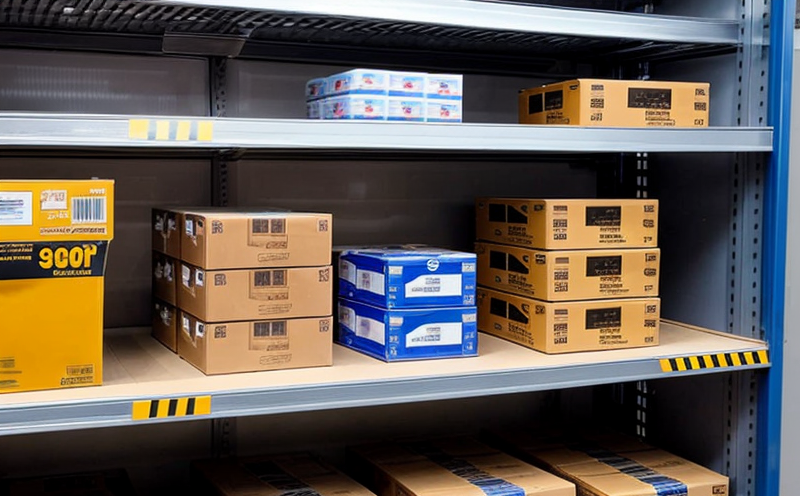ASTM F1980 Accelerated Aging Shelf-Life Testing
The ASTM F1980 standard is a widely recognized method used to evaluate the shelf life of medical device packaging. This accelerated aging test simulates real-world storage conditions in a controlled environment, allowing manufacturers and quality assurance teams to ensure that their products will maintain integrity and efficacy over extended periods.
Medical devices are subject to various environmental factors such as temperature, humidity, light, and pressure during manufacturing and transportation. ASTM F1980 helps to predict how these factors might affect the performance of a medical device's packaging and its contents. By using this accelerated aging method, manufacturers can identify potential issues early in the development process, ensuring that their products meet regulatory requirements and quality standards.
The test involves exposing samples to specific combinations of temperature and humidity conditions for predetermined periods. After exposure, the integrity and functionality of the packaged device are assessed according to defined acceptance criteria. This ensures that any defects or degradation due to environmental factors can be identified before the product reaches the market.
It is important to note that ASTM F1980 provides a framework for testing but does not specify exact conditions, which should be tailored based on the specific characteristics of the medical device and its packaging. Laboratories conducting this test must adhere strictly to the guidelines provided in the standard, ensuring accurate and consistent results.
Understanding how different environmental factors impact your product is crucial for maintaining high-quality standards throughout the supply chain. By incorporating ASTM F1980 into your quality control processes, you can enhance patient safety by reducing the risk of premature failure or degradation of critical components within medical devices.
Why It Matters
The shelf life of a medical device is not just about how long it remains on store shelves but also its performance and safety over time. Shelf-life testing ensures that the packaging provides adequate protection against external factors like moisture, light, and mechanical stress throughout storage and distribution.
- Ensures compliance with regulatory requirements
- Enhances patient safety by preventing premature failure of devices due to environmental exposure
- Reduces waste and recalls associated with ineffective or damaged products during shelf life
The results from ASTM F1980 provide valuable insights into the expected longevity of your medical device packaging, helping you make informed decisions about materials selection, storage practices, and distribution strategies. This knowledge can significantly impact overall product lifecycle management, reducing costs associated with rework or replacement.
In summary, ASTM F1980 plays a vital role in safeguarding both patient health and operational efficiency within the medical device industry. It helps manufacturers ensure that their products maintain optimal performance and safety standards even after extended periods of storage.
Scope and Methodology
The scope of ASTM F1980 covers accelerated aging tests designed to simulate long-term exposure conditions for medical device packaging. The methodology involves exposing samples to controlled temperature, humidity, and other environmental stressors over extended periods.
| Parameter | Description |
|---|---|
| Temperature | Ranges from 40°C up to 60°C depending on the test conditions specified by ASTM F1980 |
| Humidity | Varies between 5% RH and 93% RH, again depending on the specific conditions outlined in ASTM F1980 |
| Duration | The duration can range from several days to weeks, again based on the requirements of ASTM F1980 |
After exposure, the integrity and functionality of the packaging are assessed using various techniques such as pressure testing, visual inspection, burst strength tests, and microbiological assays. Acceptance criteria vary depending on the type of medical device being tested.
The exact parameters used for each test must be determined according to ASTM F1980 guidelines tailored specifically to your product's needs. Properly conducted ASTM F1980 testing ensures reliable predictions of shelf life under real-world storage conditions, enabling manufacturers to optimize their processes and meet regulatory expectations effectively.
Industry Applications
ASTM F1980 Shelf-Life Testing is applicable across various segments within the medical device industry. This includes implantable devices, pharmaceutical packaging, diagnostic kits, and surgical instruments among others.
- Implantable Devices: Ensuring that implants remain sterile and functional throughout their intended use lifecycle
- Pharmaceutical Packaging: Maintaining the integrity of drug containers to prevent contamination during transport and storage
- Diagnostics Kits: Guaranteeing accuracy in test results even after prolonged shelf life
- Surgical Instruments: Verifying that reusable instruments maintain their sharpness and effectiveness over extended periods
In addition to these specific applications, ASTM F1980 can also be utilized by contract manufacturers who produce packaging for medical devices or pharmaceutical products. By following this standard, they ensure consistent quality across all batches of packaging used in manufacturing processes.
Given the critical nature of medical device integrity and patient safety, compliance with ASTM F1980 is essential for any organization involved in the design, development, production, or distribution of medical devices. It helps maintain trust between healthcare providers and patients while ensuring regulatory compliance.





